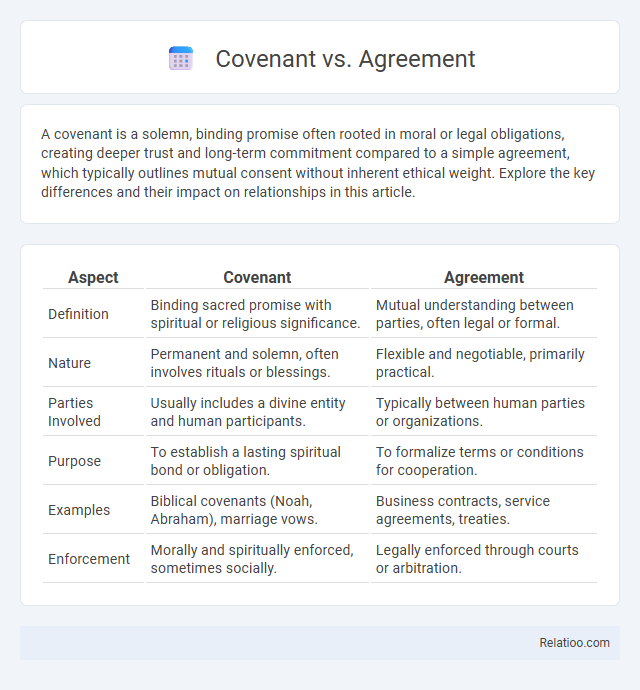A covenant is a solemn, binding promise often rooted in moral or legal obligations, creating deeper trust and long-term commitment compared to a simple agreement, which typically outlines mutual consent without inherent ethical weight. Explore the key differences and their impact on relationships in this article.
Table of Comparison
| Aspect | Covenant | Agreement |
|---|---|---|
| Definition | Binding sacred promise with spiritual or religious significance. | Mutual understanding between parties, often legal or formal. |
| Nature | Permanent and solemn, often involves rituals or blessings. | Flexible and negotiable, primarily practical. |
| Parties Involved | Usually includes a divine entity and human participants. | Typically between human parties or organizations. |
| Purpose | To establish a lasting spiritual bond or obligation. | To formalize terms or conditions for cooperation. |
| Examples | Biblical covenants (Noah, Abraham), marriage vows. | Business contracts, service agreements, treaties. |
| Enforcement | Morally and spiritually enforced, sometimes socially. | Legally enforced through courts or arbitration. |
Introduction to Covenant and Agreement
A covenant is a solemn and binding promise typically found in legal or religious contexts, establishing obligations between parties that are intended to be enduring and enforceable. An agreement, by contrast, is a broader term encompassing any mutual understanding or arrangement between two or more parties, which may or may not be legally binding. Understanding the distinction between a covenant and an agreement helps you identify the level of commitment and legal implications involved in your contracts or obligations.
Defining Covenant: Key Characteristics
A covenant is a solemn, legally binding promise or commitment often found in contracts, real estate, and religious contexts, characterized by its enforceability and specific obligations. Unlike general agreements, covenants impose strict duties or restrictions on parties, ensuring compliance over time. Understanding your covenant means recognizing its guaranteed terms and the lasting impact it holds on property rights, business dealings, or moral conduct.
Understanding Agreement: Main Features
An agreement is a mutual understanding between parties that outlines their rights and obligations, often forming the foundation for legally binding contracts. Unlike a covenant, which is a solemn promise typically found in legal or religious contexts, an agreement can be informal or formal and may lack enforceable obligations unless supported by consideration. Your comprehension of agreements should emphasize clarity, mutual consent, and the presence of essential elements like offer, acceptance, and consideration to ensure enforceability.
Covenant vs Agreement: Core Differences
Covenant and agreement both refer to commitments between parties, but a covenant is a solemn, legally binding promise often found in contracts or deeds, emphasizing a strong moral or legal obligation. An agreement covers a broader scope, including any mutual understanding or arrangement without necessarily carrying the same enforceable weight as a covenant. Your choice depends on the level of legal enforcement and formality required in your transaction or relationship.
Legal Implications of Covenants and Agreements
Covenants and agreements are legally binding promises, but covenants often imply a formal, solemn commitment with specific conditions enforceable by law, particularly in real estate and contract law. Agreements broadly encompass any mutual understanding or arrangement, which may or may not carry enforceable obligations depending on the presence of consideration and legal formalities. Legal implications of covenants typically involve restrictive or affirmative obligations that can run with the land or impose liabilities, whereas agreements require clear intent and terms to establish enforceability in courts.
Examples of Covenants in Practice
Covenants in practice often appear in real estate, where a homeowner agrees to maintain property standards or restrictions like no commercial use, ensuring neighborhood consistency and property value. You might encounter covenants in loan agreements requiring timely payments or maintaining insurance coverage to protect lender interests. Unlike general agreements, covenants impose binding promises essential for long-term commitments and legal enforcement.
Common Types of Agreements
Common types of agreements include contracts, leases, non-disclosure agreements, and service agreements, each defining specific obligations between parties. Covenants, typically found within real estate or loan contracts, are legally binding promises to perform or refrain from certain actions, often aimed at maintaining property conditions or loan terms. Unlike general agreements, covenants impose stricter, more specific duties that parties must adhere to during the contract's duration.
Covenants and Agreements in Business Contracts
Covenants in business contracts are binding promises or obligations that parties must fulfill, often outlining specific duties like non-compete clauses or confidentiality requirements. Agreements, on the other hand, represent the overall mutual understanding and consent between parties, encompassing terms, conditions, and covenants within the contract. Effective business contracts rely on clearly defined covenants to ensure compliance and enforceability, distinguishing these from general agreements that establish the contract's framework.
How to Choose: Covenant or Agreement?
Choosing between a covenant and an agreement depends on the level of commitment and enforceability you require for Your contract. A covenant typically involves a solemn, legally binding promise often found in real estate or formal contracts, emphasizing long-term obligations and strict compliance. An agreement is broader and can be informal or formal, focusing on mutual understanding and terms but may lack the binding force and specificity that a covenant provides.
Conclusion: Covenant vs Agreement Simplified
A covenant is a formal, legally binding promise often used in real estate or contracts to impose specific obligations or restrictions, whereas an agreement is a broader term encompassing any mutual understanding between parties that may or may not be legally enforceable. Covenants usually have stricter terms and longer durations, emphasizing compliance and consequences, while agreements can be informal and flexible. Simplified, all covenants are agreements, but not all agreements qualify as covenants due to the specific, enforceable nature of covenants.

Infographic: Covenant vs Agreement
 relatioo.com
relatioo.com